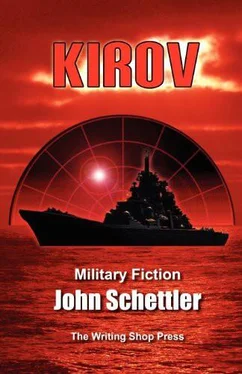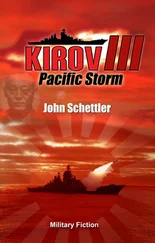John Schettler - Kirov
Здесь есть возможность читать онлайн «John Schettler - Kirov» весь текст электронной книги совершенно бесплатно (целиком полную версию без сокращений). В некоторых случаях можно слушать аудио, скачать через торрент в формате fb2 и присутствует краткое содержание. Жанр: Фантастика и фэнтези, Альтернативная история, на английском языке. Описание произведения, (предисловие) а так же отзывы посетителей доступны на портале библиотеки ЛибКат.
- Название:Kirov
- Автор:
- Жанр:
- Год:неизвестен
- ISBN:нет данных
- Рейтинг книги:5 / 5. Голосов: 1
-
Избранное:Добавить в избранное
- Отзывы:
-
Ваша оценка:
- 100
- 1
- 2
- 3
- 4
- 5
Kirov: краткое содержание, описание и аннотация
Предлагаем к чтению аннотацию, описание, краткое содержание или предисловие (зависит от того, что написал сам автор книги «Kirov»). Если вы не нашли необходимую информацию о книге — напишите в комментариях, мы постараемся отыскать её.
Kirov — читать онлайн бесплатно полную книгу (весь текст) целиком
Ниже представлен текст книги, разбитый по страницам. Система сохранения места последней прочитанной страницы, позволяет с удобством читать онлайн бесплатно книгу «Kirov», без необходимости каждый раз заново искать на чём Вы остановились. Поставьте закладку, и сможете в любой момент перейти на страницу, на которой закончили чтение.
Интервал:
Закладка:
“The German radar must be better than we realize, sir.”
“That's well over the horizon, Brind. They would have to have aircraft up with long-range radars to see out that far.”
“Our own type 279 radar is good up to 100 miles under decent conditions. Admiralty suggests they may have a pair of spotter planes up to either side of the ship setting up kind of triangulation. That would improve accuracy considerably if they were reading three signals and somehow managing to coordinate them.”
“Yes I suppose that's possible, but guiding the rockets in like that? Almost every rocket in use today is unguided, like the Russian Katyushas. This is something altogether new. It changes everything. We’ll have to throw out the book and completely reevaluate the way we operate with our carriers now. If they can cut our torpedo squadrons to pieces like this before they get anywhere near the target, then ships like Victorious and Furious are practically useless as an offensive threat. We can use them as radar pickets and scout detachments, or to provide air cover over our own fleets, but not for very much else. Trying to throw Swordfish torpedo bombers, or even these new Albacore at the enemy is just throwing lives and planes away, not to mention the torpedoes.”
“Then again this could have been the lucky hit, sir. And if Wake-Walker had vectored in his squadrons from different approaches, the Germans might not have been able to track them as well, particularly if they are using some sort of triangulation system.”
“Good point. I suppose only time will tell. But for the moment, it's beginning to look again like this bloody business is a job for the battleships. They can fling all the ack-ack rockets they want at King George V and they won't put a scratch on us.”
Brind had another thought. “This may be a wild shot, sir, but what about Graf Zeppelin? It was a converted cruiser, that long forward deck reported on this contact might've been a landing strip, it explains how Jerry could have airplanes up triangulating like this, and the biggest gun reported to be on that ship is in the range of the weapon that struck the destroyer Anthony.”
Tovey considered that for some time, and then said: “You might be onto something there, Brind. We've heard nothing about Graf Zeppelin, yet we know the Germans have her in the works. You might pass that one on to the Admiralty and see what they think of it. In the meantime, Graf Zeppelin or not, my fourteen inch guns may have something to say about it soon enough.”
Chapter 17
August 3, 1941
Kirov raced south into the Denmark Strait, and behind her a dark, rolling front of bad weather surged in her wake. The British had been chastened, but not put off in the chase. They saw no further aircraft squadrons vectoring in on their position, but did note a single plane popping on and off their screens, a little under a hundred miles out. Admiral Volsky sent up a KA-40 helo to assist their over horizon coverage in the face of the oncoming storm, and they noted the British task force was still bearing on their heading, matching their speed knot for knot. As if anticipating their course, the angle of the enemy approach had change earlier, however, and they managed to cut twenty-five miles off the lead Kirov had for the moment.
They rounded the northernmost headlands of Iceland, and continued southwest, paralleling the distant icy coast of Greenland. With the KA-40 up, Rodenko had a good fix on the shadowing British task force, noting that it had broken into two groups, one out in front slowly gaining on their position, and a second body falling behind.
“What do you make of this?” Admiral Volsky asked Karpov.
“They are deploying a screen,” said the Captain. “They want to make sure they can adequately protect their carriers.”
Fedorov could not help overhearing the conversation, and though he thought it risky to contradict the Captain, he cleared his throat and ventured to speak up. “If I may, sir, we know the exact composition of this task force. It's been matching our speed for the last six and a half hours now, and we're running at thirty knots. The only ships in that force that could move out in front like this would be the destroyers, they could make thirty-five or thirty-six knots, which is why that leading group is slowly gaining on us. I believe they may have decided to try and catch us with these fast destroyers, sir. They did the same against Bismarck, detaching destroyers assigned to convoy duty to catch up with her and harass her until the bigger ships could come up.”
“More of those tin cans?” said Karpov. “We should've sunk that first destroyer when she came upon us earlier. That would have given them pause.”
“Mister Fedorov has a point,” said Volsky. “Keep an eye on this leading group, Mister Rodenko.”
“They are at the edge of our surface radar coverage now, sir. Unless we keep a KA-40 up I won't have a good fix on them at this range. But if they do close on our position, I'll see them in plenty of time. Our difference in speed is no more than five nautical miles per hour. At the rate they are gaining on us they could not pose a threat for quite some time.”
“In that case, I do not think it's necessary to keep the helicopter airborne. We must conserve aviation fuel whenever possible.”
Kirov, in its original configuration, had used a combination nuclear and steam turbine propellant system. The new ship relied entirely on its nuclear propulsion system, and the space used by the old steam driven turbines had been utilized to add reserve stocks of aviation fuel for the three helicopters. But even this was a finite supply, and the Admiral was looking far ahead in his thinking.
“In the meantime,” said Volsky, “there is another consideration we must discuss. According to Mister Fedorov's history book the Americans are now taking over garrison duty for the bases on Iceland. They have their flying boat patrol craft at two locations, and there may still be American naval units in this sector as well. I don't have to remind you that the United States has not yet entered the war, and will not do so for another four months. We must be careful, and do nothing that might prompt them to reconsider their situation.”
“Why should we worry about that?” said Karpov.
“Because at this time Roosevelt is struggling with strong anti-war sentiment within the United States,” said Fedorov. “If we are reported as a new German raider, and we make a direct attack against American ships or planes, that could quickly change the situation. An early entry of the United States in this war would serve to undo your plan, Captain. Suppose the Americans end up getting to Berlin four months early?”
“Thank you, Mister Fedorov,” Karpov said dryly. He resented a junior officer countering him, particularly in front of the Admiral. Fedorov was becoming just a bit too forward, and he decided to have a word with Orlov about him. Then Volsky continued, extending his reasoning as he now saw the situation.
“Very well… the British believe we are a German raider as Mister Fedorov suggests. What else? At this very moment they're trying to determine what ship we might be, and eventually they will narrow down the list and find the Germans have nothing whatsoever that can do the things they have been observing. They may well be wondering now what could have destroyed their aircraft so easily, and at such range. They're not stupid, and soon their intelligence system will begin to put the pieces of this puzzle together, just as we did. We had the advantage of longer range detection systems and high-powered HD video. We faced the impossible question first, and eventually realized what had happened. At some point they will do the same. But until that time, we have the considerable advantage of surprise, in more ways than one. They have not yet seen a fraction of what we are capable of doing. I want to keep them in the dark as long as possible. We have played out the Jack, but still hold the Queen, King and Ace close to our chest.”
Читать дальшеИнтервал:
Закладка:
Похожие книги на «Kirov»
Представляем Вашему вниманию похожие книги на «Kirov» списком для выбора. Мы отобрали схожую по названию и смыслу литературу в надежде предоставить читателям больше вариантов отыскать новые, интересные, ещё непрочитанные произведения.
Обсуждение, отзывы о книге «Kirov» и просто собственные мнения читателей. Оставьте ваши комментарии, напишите, что Вы думаете о произведении, его смысле или главных героях. Укажите что конкретно понравилось, а что нет, и почему Вы так считаете.












